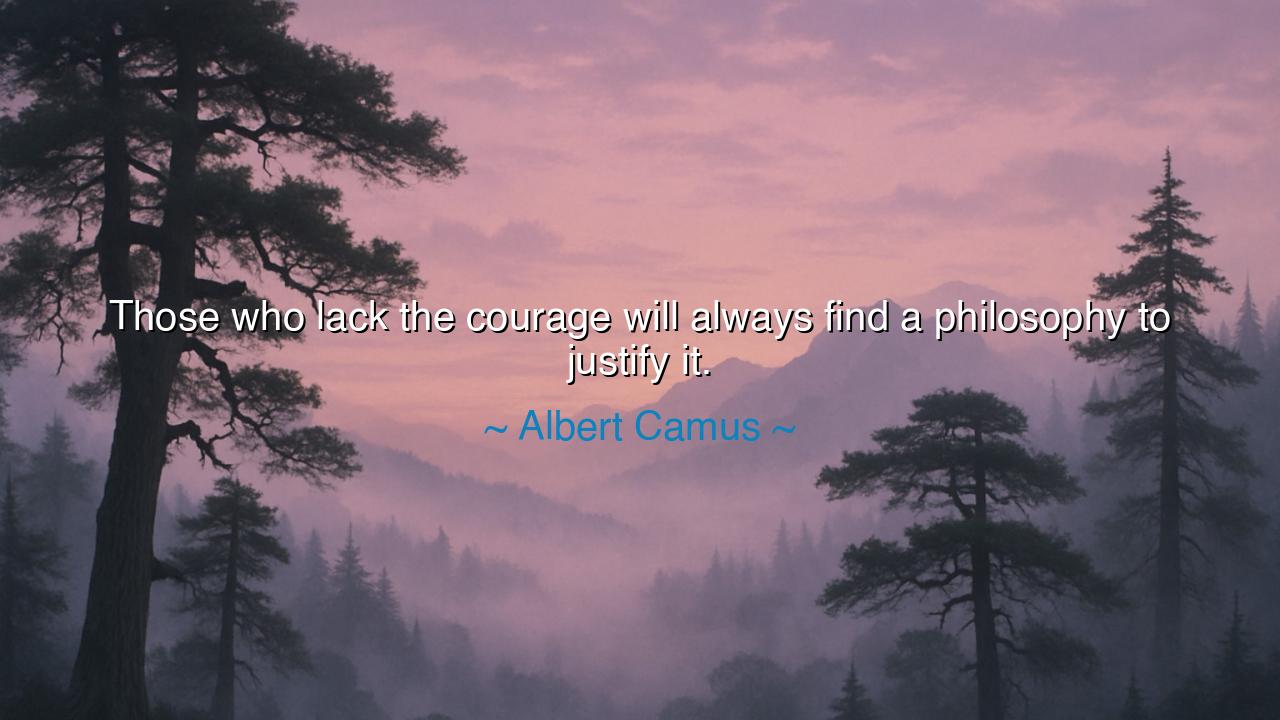
Those who lack the courage will always find a philosophy to






“Those who lack the courage will always find a philosophy to justify it.” Thus spoke Albert Camus, the philosopher of rebellion, the poet of the absurd, whose words pierce through the comforting veils of self-deception and expose the trembling heart of human frailty. In this truth, Camus reminds us that cowardice often wears the mask of wisdom, and that fear, when not confronted, disguises itself as intellect, morality, or reason. The soul that will not act finds a thousand noble excuses for inaction. The coward, too clever to admit his fear, will instead call it caution, prudence, or even philosophy. Thus, Camus warns us — beware not only of weakness, but of the lies we tell ourselves to make weakness seem virtuous.
To understand these words, we must know the man who spoke them. Albert Camus, born in Algeria in 1913, lived through the great upheavals of the twentieth century — war, tyranny, and moral collapse. He saw how easily men betrayed their conscience, not always out of malice, but out of fear. In the shadow of war, many justified their silence as “realism,” their submission as “loyalty,” their indifference as “neutrality.” Yet beneath these philosophies, Camus saw only one truth: the absence of courage — the courage to resist, to speak, to stand alone. From this vision was born his philosophy of the absurd, and his belief that to live with dignity is to act without illusion, even in the face of despair.
In his quote, Camus strikes at the most subtle of human weaknesses: our talent for self-deception. For every man and woman must one day face fear — fear of loss, of pain, of rejection, of death. The courageous one acknowledges fear and acts in spite of it. But those who cannot bear the burden of fear seek refuge not in truth, but in rationalization. They build philosophies to defend their paralysis. The coward says, “It is wiser not to fight,” when his heart knows it is only safer. The coward says, “There is no hope,” when hope would demand action. Thus, fear becomes reason’s counterfeit, and cowardice disguises itself as logic.
History offers countless examples of this truth. When Socrates was condemned to death, many of his students begged him to flee Athens. They had every argument ready — “It would be prudent,” they said, “to live and teach in exile. Philosophy must survive.” Yet Socrates, who feared neither death nor dishonor, refused their justifications. He would rather die for truth than live for comfort. The same arguments his friends made in the name of wisdom were, in truth, born of fear. Thus, Socrates revealed the timeless divide between courage and self-deception: one chooses truth at any cost, the other builds theories to excuse its abandonment.
We see this also in modern times — in those who witness injustice yet remain silent, explaining, “It is not my place,” or “The system cannot be changed.” These are the new philosophers of fear, cloaking cowardice in the language of reason. When nations have fallen, when atrocities have been committed, it was often not the cruelty of a few that destroyed them, but the timidity of the many who justified their inaction as realism. As Camus wrote elsewhere, “The evil in the world almost always comes from ignorance, and goodwill can cause as much harm as ill will if it is not enlightened.” He knew that the greatest threat to justice is not hatred — it is cowardice pretending to be wisdom.
And yet, Camus does not condemn humanity; he calls us to awakening. His words are not an accusation, but a challenge — to strip away our excuses and stand naked before the truth. For courage, he says, is not the absence of fear but the triumph over it. To act without guarantees, to speak when silence is easier, to choose integrity over comfort — these are the acts of the courageous soul. And when one lives this way, life itself becomes an act of rebellion against despair.
The lesson, then, is this: do not seek safety in philosophy when your heart calls for action. Beware the mind’s cunning, which turns fear into doctrine. Ask yourself, in moments of hesitation — am I truly wise, or merely afraid? When you find yourself rationalizing inaction, remember that every philosophy that denies courage becomes an illusion. The path of truth is seldom comfortable, but it alone leads to freedom.
So remember the words of Albert Camus, and let them burn within you like a sacred fire: “Those who lack the courage will always find a philosophy to justify it.” Let your philosophy be not one of retreat, but of engagement. Let your thoughts serve your bravery, not excuse your fear. Stand firm in what you know to be right, even when the world trembles around you. For the measure of a life is not how safely it is lived, but how truly it is faced — with eyes open, heart steady, and spirit unafraid.






AAdministratorAdministrator
Welcome, honored guests. Please leave a comment, we will respond soon